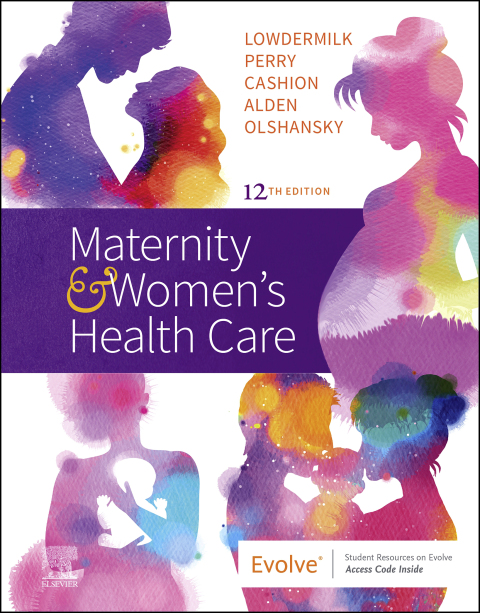Description
Efnisyfirlit
- Instructions for online access
- Cover image
- Title page
- Table of Contents
- Copyright
- About the Authors
- Contributors
- List of Reviewers
- Preface
- Acknowledgments
- PART 1. Introduction to Maternity and Women“s Health Care
- 1. 21st-Century Maternity and Women’s Health Nursing
- Current Concerns in the Care of Women and Infants
- Efforts to Reduce Health Disparities
- Contemporary Issues and Trends
- Trends in Fertility and Birth Rate
- Regionalization of Perinatal Health Care Services
- High-Technology Care
- Community-Based Care
- Childbirth Practices
- Involving Consumers and Promoting Self-Management
- International Concerns
- Women’s Health
- Trends in Nursing Practice
- Standards of Practice and Legal Issues in Provision of Care
- Ethical Issues in Perinatal Nursing and Women’s Health Care
- Research in Perinatal Nursing and Women’s Health Care
- Key Points
- 2. The Family and Culture
- Introduction to Family, Culture, and Home Care
- The Family in Cultural and Community Context
- The Family in a Cultural Context
- Developing Cultural Competence
- Care of the Woman at Home
- Key Points
- 3. Nursing and Genomics
- Genetics/Genomics
- Genetic Counseling
- Key Points
- PART 2. Women’s Health
- 4. Assessment and Health Promotion
- Female Reproductive System
- Menstruation and Menopause
- Sexual Response
- Reasons for Entering the Health Care System
- Barriers to Entering the Health Care System
- Caring for the well Woman Across the Life Span: The Need for Health Promotion and Disease Prevention
- Approaches to Care at Specific Stages of a Woman’s Life
- Pregnancy
- Identification of Risk Factors to Women’s Health
- Health Assessment
- Anticipatory Guidance for Health Promotion and Illness Prevention
- Key Points
- 5. Violence Against Women
- Intimate Partner Violence
- Theories, Perspectives, Frameworks, and Models that Seek to Explain Intimate Partner Violence
- Care Management
- Sexual Violence
- Care Management
- Human Trafficking
- Key Points
- 6. Reproductive System Concerns
- Menstrual Disorders
- Menopause
- Care Management
- Key Points
- 7. Sexually Transmitted and Other Infections
- Prevention
- Sexually Transmitted Bacterial Infections
- Sexually Transmitted Viral Infections
- Concerns of the Lesbian, Gay, Bisexual, and Transsexual Community
- Maternal and Fetal Effects of Sexually Transmitted Infections
- Torch Infections
- Care Management
- Key Points
- 8. Contraception and Abortion
- Contraception
- Care Management
- Methods of Contraception
- Biologic Marker Methods
- Induced Abortion
- Care Management
- Key Points
- 9. Infertility
- Incidence
- Factors Associated with Infertility
- Male Infertility Causes
- Transgender Fertility Issues
- Care Management
- Interventions
- Key Points
- 10. Problems of the Breast
- Benign Conditions of the Breast
- Care Management for Women with Benign Breast Conditions
- Malignant Conditions of the Breast
- Care Management for Women With Breast Cancer
- Key Points
- 11. Structural Disorders and Neoplasms of the Reproductive System
- Structural Disorders of the Uterus and Vagina
- Benign Neoplasms
- Care Management
- Malignant Neoplasms
- Care Management
- Care Management
- Key Points
- PART 3. Pregnancy
- 12. Conception and Fetal Development
- Conception
- Embryo and Fetus
- Factors Influencing Fetal Growth and Development
- Key Points
- 13. Anatomy and Physiology of Pregnancy
- Adaptations to Pregnancy
- Diagnosis of Pregnancy
- Key Points
- 14. Nursing Care of the Family During Pregnancy
- Diagnosis of Pregnancy
- Adaptation to Pregnancy
- Care Management
- Variations in Prenatal Care
- Perinatal Education
- Perinatal Care Choices
- Key Points
- 15. Maternal and Fetal Nutrition
- Nutrient Needs Before Conception
- Nutrient Needs During Pregnancy
- Care Management
- Key Points
- PART 4. Labor and Birth
- 16. Labor and Birth Processes
- Factors affecting labor
- Process of Labor
- Physiologic adaptation to labor
- Key Points
- 17. Maximizing Comfort for the Laboring Woman
- Pain During Labor And Birth
- Factors Influencing Pain Response
- Nonpharmacologic Pain Management
- Pharmacologic Pain Management
- Care Management
- Key Points
- 18. Fetal Assessment During Labor
- Basis for Monitoring
- Monitoring Techniques
- Fetal Heart Rate Patterns
- Care Management
- Client and Family Teaching
- Documentation
- Key Points
- 19. Nursing Care of the Family During Labor and Birth
- First Stage of Labor
- Care Management
- Second Stage of Labor
- Care Management
- Third Stage of Labor
- Care Management
- Fourth Stage of Labor
- Care Management
- Key Points
- PART 5. Postpartum
- 20. Postpartum Physiologic Changes
- Reproductive System and Associated Structures
- Cardiovascular System
- Respiratory System
- Endocrine System
- Urinary System
- Gastrointestinal System
- Integumentary System
- Musculoskeletal System
- Neurologic System
- Immune System
- Key Points
- 21. Nursing Care of the Family During the Postpartum Period
- Transfer from the Recovery Area
- Planning for Discharge
- Care Management: Physical Needs
- Care Management: Psychosocial Needs
- Discharge Teaching
- Key Points
- 22. Transition to Parenthood
- Parent-Infant Relationships, Bonding, and Attachment
- Parent-Infant Contact
- Communication Between Parent and Infant
- Transition to Parenthood
- Influences on Transition to Parenthood
- Sibling Adaptation
- Grandparent Adaptation
- Care Management
- Key Points
- PART 6. The Newborn
- 23. Physiologic and Behavioral Adaptations of the Newborn
- Stages of Transition to Extrauterine Life
- Physiologic Adaptations
- Behavioral Adaptations
- Key Points
- 24. Nursing Care of the Newborn and Family
- Care Management: Birth Through the First 2 Hours
- Care Management: From 2 Hours After Birth Until Discharge
- Key Points
- 25. Newborn Nutrition and Feeding
- Recommended Infant Nutrition
- Cultural Influences on Infant Feeding
- Nutrient Needs
- Anatomy and Physiology of Lactation
- Care Management
- Formula-Feeding
- Key Points
- PART 7. Complications of Pregnancy
- 26. Assessment of High-Risk Pregnancy
- Assessment of Risk Factors
- Antepartum Testing
- Biophysical Assessment
- Biochemical Assessment
- Fetal Care Centers
- Antepartum Assessment Using Electronic Fetal Monitoring
- Psychologic Considerations Related to High-Risk Pregnancy
- The Nurse’s Role in Assessment and Management of the High-Risk Pregnancy
- Key Points
- 27. Hypertensive Disorders
- Significance and Incidence
- Classification
- Chronic Hypertensive Disorders
- Preeclampsia
- Care Management
- Key Points
- 28. Hemorrhagic Disorders
- Early Pregnancy Bleeding
- Care Management
- Care Management
- Care Management
- Care Management
- Late Pregnancy Bleeding
- Care Management
- Care Management
- Care Management
- Key Points
- 29. Endocrine and Metabolic Disorders
- Metabolic Changes Associated with Pregnancy
- Diabetes Mellitus
- Pregestational Diabetes Mellitus and Pregnancy
- Care Management
- Gestational Diabetes Mellitus
- Care Management
- Hyperemesis Gravidarum
- Care Management
- Thyroid Disorders
- Maternal Phenylketonuria
- Key Points
- 30. Medical-Surgical Disorders
- Cardiovascular Disorders
- Care Management
- Other Medical Disorders in Pregnancy
- Surgery During Pregnancy
- Care Management
- Trauma During Pregnancy
- Care Management
- Key Points
- 31. Mental Health Disorders and Substance Abuse
- Perinatal Mental Health Disorders
- Diagnosis
- Care Management
- Postpartum Mood Disorders
- Care Management
- Anxiety Disorders
- Care Management
- Perinatal Substance Abuse
- Care Management
- Key Points
- 32. Labor and Birth Complications
- Preterm Labor and Birth
- Care Management
- Prelabor Rupture of Membranes
- Care Management
- Chorioamnionitis
- Postterm Pregnancy, Labor, and Birth
- Care Management
- Dysfunctional Labor (Dystocia)
- Care Management
- Obesity
- Care Management
- Obstetric Procedures
- Care Management
- Obstetric Emergencies
- Care Management
- Care Management
- Care Management
- Care Management
- Care Management
- Key Points
- 33. Postpartum Complications
- Postpartum Hemorrhage
- Care Management
- Hemorrhagic (Hypovolemic) Shock
- Care Management
- Coagulopathies
- Venous Thromboembolic Disorders
- Care Management
- Postpartum Infection
- Care Management
- Key Points
- PART 8. Newborn Complications
- 34. Nursing Care of the High-Risk Newborn
- Preterm Infants
- Late Preterm Infants
- Postmature Infants
- Growth-Restricted Infants
- Large for Gestational Age Infants
- Discharge Planning
- Transport of Infants
- Anticipatory Grief
- Key Points
- 35. Acquired Problems of the Newborn
- Birth Trauma
- Care Management
- Infants of Mothers with Diabetes
- Neonatal Infections
- Care Management
- Substance Abuse
- Care Management
- Key Points
- 36. Hemolytic Disorders and Congenital Anomalies
- Hemolytic Disease of the Newborn
- Care Management
- Congenital Anomalies
- Inborn Errors of Metabolism
- Care Management
- Key Points
- 37. Perinatal Loss, Bereavement, and Grief
- Loss, Bereavement, and Grief: Basic Concepts and Theories
- Types of Losses Associated with Pregnancy
- Miles’s Model of Parental Grief Responses
- Family Aspects of Grief
- Care Management
- When a Loss is Diagnosed: Helping the Woman and Her Family in the Aftermath
- Special Circumstances
- Key Points
- Index
- Features





